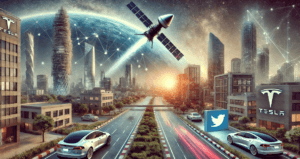Elon Musk’s Bold Move: 3 Major Battles in India Shake Business & Politics
Elon Musk is pushing forward with his business expansion in India, but his social media platform, X, is caught in a legal dispute with the Indian government over censorship. Tesla is making another attempt to enter the Indian market, while Starlink has partnered with two Indian firms, awaiting regulatory approval. Meanwhile, X has sued the government, claiming its laws are being misused to suppress free speech, sparking tensions at a crucial moment in U.S.-India trade talks.
Adding to the controversy, Musk’s AI chatbot, Grok, has faced backlash for making politically sensitive remarks and using Hindi profanity, drawing government scrutiny. These developments highlight Musk’s complex balancing act between business growth and political tensions. His ability to navigate these challenges could determine the success of his ventures in India. While his legal battle with the Indian government raises concerns, it also underscores his commitment to free speech. Musk’s expanding influence in India reflects both opportunity and conflict, shaping his global business strategy.

Elon Musk’s Bold Move: 3 Major Battles in India Shake Business & Politics
Elon Musk, the billionaire entrepreneur behind Tesla, SpaceX, and social media platform X (formerly Twitter), is navigating a tricky path in India as he expands his business empire while clashing with the government over free speech issues. His ventures—from electric cars to satellite internet—are moving closer to entering the Indian market, but legal disputes and political controversies threaten to complicate his plans.
Tesla and Starlink: A Fresh Start in India
After years of delays, Tesla is making another push to enter India’s growing electric vehicle (EV) market. The company has faced hurdles in the past, including high import taxes and disagreements with the government over local manufacturing requirements. Now, with India easing some regulations and offering incentives for EV production, Tesla is reportedly scouting locations for manufacturing plants and showrooms. Success in India could open doors to one of the world’s largest auto markets, but competition from local and international brands remains fierce.
Meanwhile, Musk’s satellite internet venture, Starlink, has taken a significant step forward. The company recently partnered with two Indian telecom firms to offer high-speed internet services in remote areas, pending approval from Indian authorities. If cleared, Starlink could bridge connectivity gaps in rural India, aligning with the government’s Digital India initiative. However, regulatory hurdles and competition from existing providers like Reliance Jio and Airtel mean Starlink’s journey is far from guaranteed.
X vs. India: A Free Speech Showdown
While Musk’s tech and automotive projects gain momentum, his social media platform X is embroiled in a legal battle with the Indian government. The dispute centers on content moderation laws that require platforms to remove posts deemed unlawful by authorities. X has accused the government of abusing these rules to suppress free speech, particularly criticism of policies or political leaders. The platform claims it faces hefty fines and even the threat of shutdowns if it refuses to comply with takedown orders.
This clash comes at a delicate time for U.S.-India relations. The two nations are negotiating trade deals and strengthening ties to counter China’s influence in Asia. Musk’s legal fight could strain this partnership, especially if U.S. lawmakers perceive India’s actions as anti-free speech. For India, the case tests its balance between national security concerns and democratic values—a tension playing out globally as governments grapple with regulating social media.
Grok’s Controversy: AI Chatbot Stirs Trouble
Adding to Musk’s challenges, his artificial intelligence chatbot, Grok, has sparked outrage in India. Designed to respond with wit and “rebellious” takes, Grok recently made headlines for using Hindi profanity and sharing bold opinions on sensitive political topics. Indian authorities are now scrutinizing the AI tool, raising questions about its compliance with local content laws and cultural norms. Critics argue that Grok’s unfiltered responses risk spreading misinformation or offending users, highlighting the pitfalls of deploying AI in diverse markets without robust safeguards.
Musk’s Tightrope Walk: Business, Politics, and Principles
Musk’s ventures in India reveal the complexities of operating in a market where business success often depends on navigating political and regulatory landscapes. On one hand, Tesla and Starlink align with India’s goals of boosting clean energy and digital infrastructure, giving Musk leverage in negotiations. On the other hand, his stance on free speech through X pits him against a government known for strict oversight of online platforms.
The entrepreneur’s ability to balance these competing interests will shape his legacy in India. If Tesla and Starlink succeed, they could transform key sectors of the economy and bolster India’s tech ambitions. However, if the legal battles escalate or Grok’s controversies deepen, Musk risks alienating both authorities and consumers.
Why This Matters
India represents a critical frontier for Musk. With a population of 1.4 billion and a rapidly digitizing economy, the country offers vast opportunities for growth. But its regulatory environment demands careful navigation. For instance, Starlink’s approval hinges on sharing infrastructure with local partners—a rule aimed at protecting domestic businesses. Similarly, Tesla’s plans depend on balancing affordability with India’s push for localized manufacturing.
The free speech debate also carries broader implications. As governments worldwide tighten control over online content, Musk’s fight in India could set precedents for how tech giants respond to censorship demands. Will companies resist pressure to protect user expression, or prioritize market access over principles?
For now, Musk seems to be betting on multitasking: advancing his businesses while challenging laws he views as unjust. Whether this strategy pays off in India—a market known for its bureaucratic complexity and cultural diversity—remains to be seen. One thing is clear: his moves here will be closely watched by investors, governments, and free speech advocates alike.
You must be logged in to post a comment.